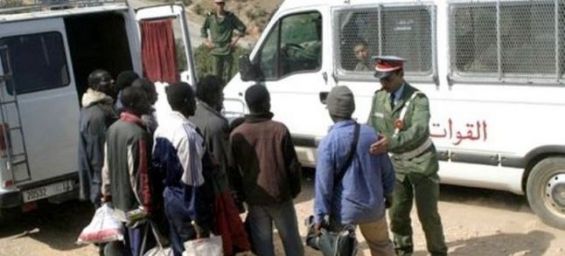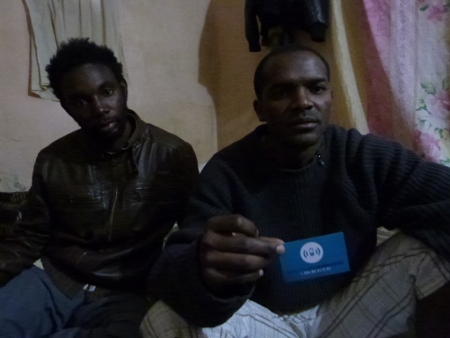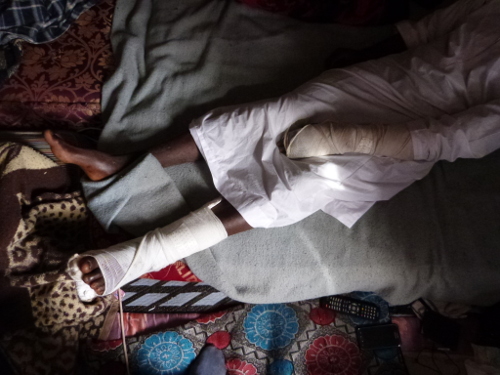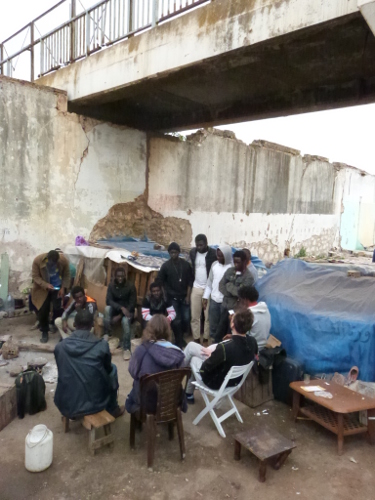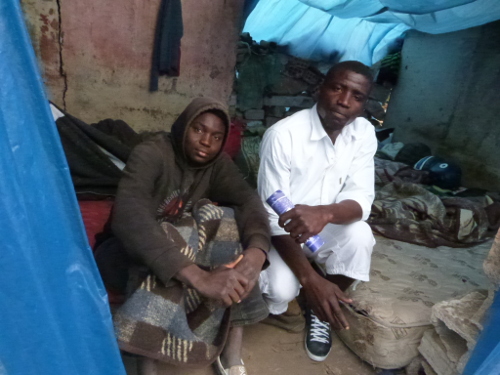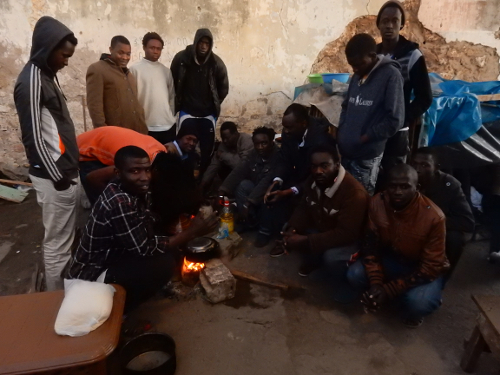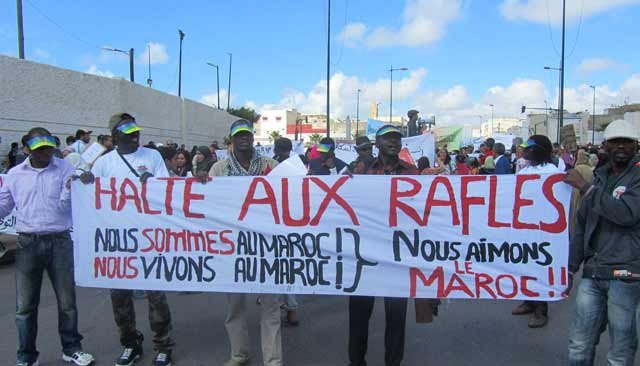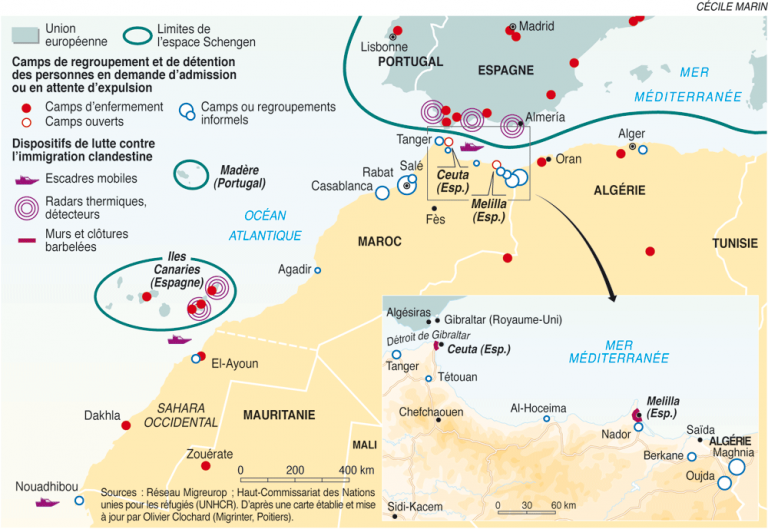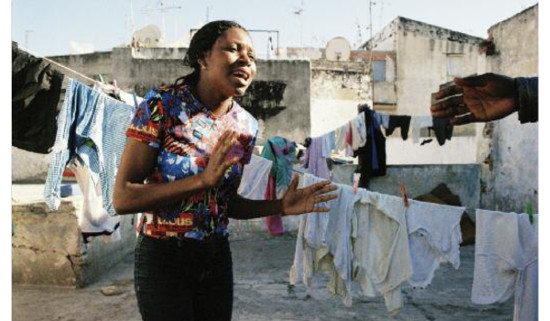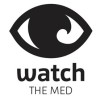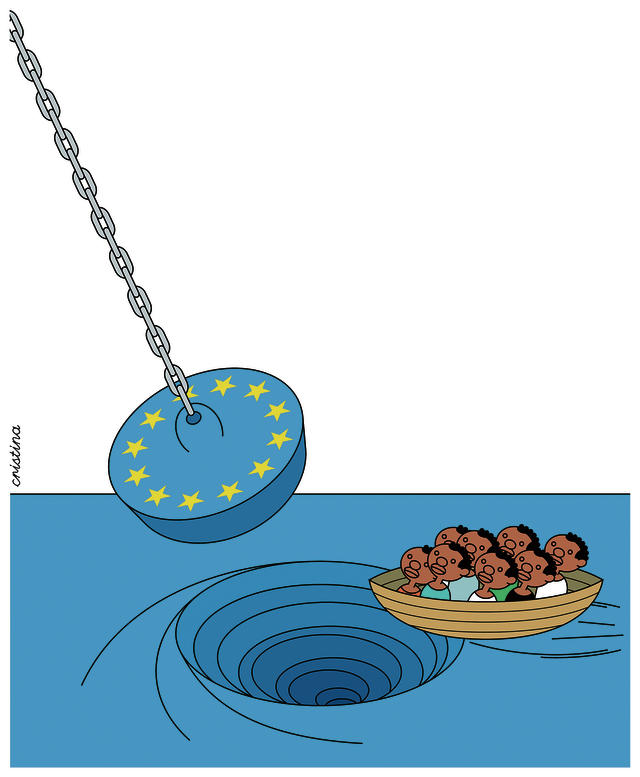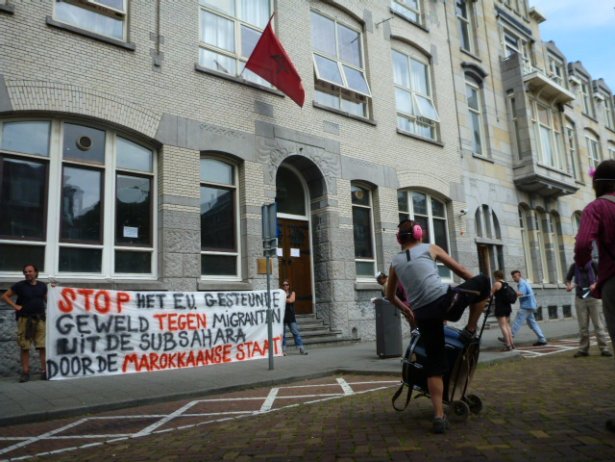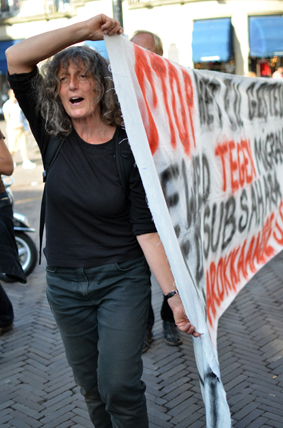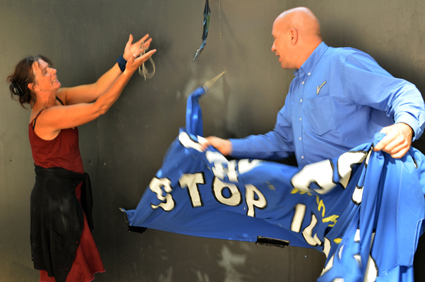For Boatpeople in Distress at Sea and in Cases of Pushback
Campaign “Ferries not Frontex” towards an open Mediterranean space! (march 2016)
WTM Alarmphone verklaring 1 jarig bestaan (12 okt. 2015)
In solidarity with migrants at sea! The Alarm Phone 3 years on with dutch press release
Moving On – 1 Year Alarm Phone Brochure and the many remarkable experiences made by Alarm Phone members in the project’s first year of existence (23 jan. 2016) with dutch press release
News, Reports & Investigations
THIS NUMBER IS NOT A RESCUE NUMBER!
But an ALARM NUMBER to support rescue operations!
What to do if you are in distress at sea or getting pushed back:
1. Call first the coast guards and tell them about your situation of distress
2. Then call the Alarm Phone
3. Note that we cannot rescue, we do not have boats or helicopters
4. We will make sure that your distress call is noted and acted upon
5. If you are not promptly rescued by the coast guards we will inform the public media and politicians to put pressure on the rescue services.
—————————————————————————————————
Alarm Phone Nr.: + 334 86 51 71 61
—————————————————————————————————
We know coastguards act quite differently. There are areas where they do their job well and rescue promptly. But refugees also report that they get pushed back by coast guards or are treated violently. When a distress call is received, we will call the coast guards ourselves, and follow up on their response, making known to them that we are informed and ‘watching’ them. We want to support you in protecting your lives and your right of freedom of movement.
FAQ (10 questions posed to the WTM alarm phone project),
Safety at Sea / Instructions for a Distress Call.
Transnational Monitoring against the deadly injustice at sea! (how Watch the Med works) and
Risks,Rights &Safety at Sea (informations for people considering to cross the sea).
For a push back operation, see “They want to see us drown” – Survivors of a push back operation in the Aegean Sea report 16.11.2014 / Chios/Greece-Cesme/Turkey
For the deadly delays in rescue operations, see the exemplary case from the 11th of October 2013 when more than 200 boat people drowned: Shipwreck 11th of October 2013.
For general information about the situation in certain european countries for refugees – see: w2eu.info / welcome to europe
Moet een kapitein een bootje met migranten in nood redden? (Vrije Universiteit Amsterdam)
[Press Release, 8th of October 2014] *Watch The Med Alarm Phone against Left-to-die cases at Sea* »Our project is no solution, but an emergency intervention«
Call for “Watch The Med Alarm Phone” for Boatpeople
(signatures below!)
11th of October 2013: Refugees from a sinking boat called again and again Italian coastguards via satellite phone in order to be rescued, but their SOS signals were not taken seriously. The boat carried more than 400 people and was shot at in the night before by a Libyan vessel. Despite the Italian and soon later the Maltese authorities having been warned of the imminent distress of the passengers, rescue efforts were delayed for several hours and patrol vessels arrived one hour after the boat had sunk. More than 200 people died, only 212 people were saved.
What would have happened if the boatpeople could have directed a second call to an independent phone-hotline through which a team of civil society members could raise alarm and put immediate pressure on authorities to rescue?
One year after the tragedy from Lampedusa on the 3rd of October and after the left-to-die case mentioned above, the situation is no less dramatic. Although the Italian military operation “mare nostrum” led to the rescue of about 100.000 refugees and migrants within the last 11 months, only in the central Mediterranean area more than 1300 boatpeople became new victims of the border-regime. In the beginning of 2014 we witnessed more death at the external borders of EU: on the 20th of January 12 refugees died when their vessel sunk while being towed at high speed by a vessel of the Greek Coast Guard aiming to push it back towards the Turkish coast.
And on the 6th of February the Spanish border guards shot with plastic-bullets at swimming migrants who tried to enter the Spanish enclave of Ceuta. More than 14 people died as a result.
These cases are not isolated, but rather the most obvious amongst many similarly deadly violations perpetrated against migrants at sea throughout the Mediterranean. Would these deaths have occurred had civil society been informed and had exercised its pressure and influence before rather than after the incidents?
We can no longer bear to remain helpless as tragedies repeat themselves. We want to do more than condemning these violations after the incidents. We believe that an alternative alarm network established by the civil society on both sides of the Mediterranean Sea could make a difference.
We neither possess any rescue-teams, nor can we offer direct protection. We are aware of our limited capabilities and of the provisional and precarious character of our initiative. But we want to immediately raise alarm when refugees and migrants get into situations of distress at sea and are not rescued promptly. We want to document in real-time and scandalize immediately when boatpeople become victims of push-back operations or are sent back to countries such as Libya, where migrant rights are repeatedly violated. We want to intervene with political pressure and public mobilisation against the daily injustices at the external borders of the EU.
We know that such pressure can be effective because it has been exercised already for several years by a few individuals who, through family and solidarity ties, have received phone calls from migrants at sea, alerted authorities and made sure that rescue operations had been carried out. We want to broaden and strengthen this network and reinforce its political role in support of migrant rights and the freedom of movement.
Thus we aim to establish – in close cooperation with the monitoring project Watch The Med – an alternative alarm-phone running 24/7 as of the 10th of October 2014. It will be managed by human rights activists from both sides of the Mediterranean and offer a multilingual team. We will advise all persons in distress at sea to first alert the officially responsible rescue teams. But we will also call the coast guards ourselves, and follow up on their responses, making known to them that we are informed and “watching” them. If they fail to respond, we will gather all imaginable political and public pressure to force them to do so.
We will alarm captains of commercial boats close by as well as international journalists, requesting the support of politically active religious leaders of all confessions as well as support of famous supporters. We will use the critical net-community for just-in-time-campaigns and call everybody to contribute with the creation of further forms of intervention.
The left-to-die cases at sea, the human right violations of the EU border agency Frontex and coast guards in all areas of the Mediterranean Sea have to be stopped immediately. We need a civil society network on both sides of the Mediterranean Sea which can enforce political pressure for the lives and the rights of boatpeople, and we want to be part of it.
Such an alternative alarm network would be a first but an urgently required step on the path toward a Euro-Mediterranean area that is not characterised by a deadly border regime but by solidarity and the right for protection and the freedom of movement.
An Initiative of: Welcome to Europe | Afrique Europe Interact | borderline-europe | Noborders Marocco | Forschungsgesellschaft Flucht und Migration | Voix des Migrantes
Signatures for the call:
Madjiguene Cisse, former Sans-Papier-Movement in Paris, Dakar | Étienne Balibar, Philosopher, Paris | Elfriede Jelinek, Author & Nobel Literature Prize Winner, Vienna | Fr. Mussie Zerai, Habeshia Agency, Rome | Mohanad Jammo, Physician & Survivor of 11.10.13 Shipwreck, Aleppo/Bad Bergzabern | Fabrizio Gatti, Journalist, Rome | Jean Ziegler, former U.N., Special Rapporteur on the Right to Food, Geneva | Emmanuel Mbolela, author of ‘Mein Weg vom Kongo nach Europa’, Amsterdam | Boats4People | Imed Soltani, La Terre pour Tous, Tunis | José Palazon, Pro.De.In, Melilla | Mikel Araguas, Andalucia Acoge | Conseil des Migrants Subsahariens au Maroc | Petja Dimitrova, Artist, Academy of Fine Arts Vienna | Antonio Negri, Philosopher, Paris | Nina Kusturica, Filmmaker, Vienna | Network of Social Support to Refugees and Migrants, Athens | Gabriele del Grande, Journalist, Milano | Jesuit Refugee Service Schweiz | Stiftung:do, Hamburg | Ousmane Diarra, AME (Association Malienne des Expulsés), Bamako | Stefan Schmidt, Captain of Cap Anamur 2004, Refugee-Commissioner of Schleswig-Holstein, Lübeck | FTDES (Forum Tunisien pour les Droits Économiques et Sociaux), Tunis | ODS, Sevilla | Karl Kopp, Director of European Affairs PRO ASYL and ECRE, Frankfurt | Amadou Mbow, AMDH (Association Mauritanienne des Droits de l’Homme), Nouakchott | Fulvio Vassallo Paleologo, L‘Altro Diritto, Sicilia | Elias Bierdel, 2002-2004 Leiter der Cap Anamur, Austria | Martin Glasenapp, Medico International, Frankfurt | Patrice Boukar Zinahad, A.R.A.CE.M (Association des Refoulés d’Afrique Centrale au Mali), Bamako | KEERFA – Movement Against Racism & Fascist Threat, Athens | ATMF, France | ARCI, Italy | Ferenc Kőszeg, Honorary Chairman of the Hungarian Helsinki-Committee, Budapest | Borderline Sicilia Onlus | Sandro Mezzadra, Border and Migration Researcher, Bologna | Osaren Igbinoba, The Voice Refugee Forum, Jena | Solidarité sans Frontières, Switzerland | Village all together, Mytilini | Association Les voix libres, Strasbourg | Article 13, Tunis | Daniel Moundzego, ARSF (Association des Refugees Sans Frontieres), Douala | Ilias Panchard, Co-Präsident Junge Grüne Schweiz, Lausanne | All Included, Amsterdam | MigSzol – Migrant Solidarity Group of Hungary | Humanistische Union, Germany | Barbed Wire Britain | Balthasar Glättli, Fraktionspräsident Grüne, Schweiz | Orcun Ulusoy, Researcher, The Hague | Maria Bacchi, Comitato Scientifico Fondazione Langer, Bolzano & Associazione Mantova Solidale | Chabaka, Tanger | Antiracist Initiative of Thessaloniki | Gergishu Yohannes, Initiative gegen Tod im Mittelmeer 2009 e.V. Bonn | Karl Heinz Roth, Social Historian & Physician, Hamburg | Michael Genner, Asyl in Not, Vienna | Conseil des Migrants France | CADTM Europe | Africa con voz propia | APDHA, Spain | The Refugee Councils, Germany | David Fedele, Filmmaker, Sydney | Franck Düvell, Researcher, COMPAS, Oxford | ALECMA (Association Lumiére sur l`Emigration Clandestine au Maghreb) | Rete Antirazzista Catanese | Comitato NoMuos/NoSigonella, Catania | Paolo Cutitta, Migration researcher, Amsterdam | Federica Sossi, Università di Bergamo | Hélène Yamta, La Voix des Femmes Migrantes, Rabat | Sabine Hess, Leiterin des Labors für kritische Migrations- und Grenzregimeforschung, Göttingen | Campaign to Close Campsfield | Luciana Zarini, retired teacher, Palermo | Maria Rosa Ragonese, teacher, Palermo | Association Horizons Migrants; bordermonitoring.eu | Wolf Dieter Narr and Dirk Vogelskamp, Commitee for Basic Rights and Democracy, Berlin/Cologne | Ahmed Jlassi, Filmmaker and University teacher, Tunis | Atmf (Association des Travailleurs Maghrébins de France). section Bas-Rhin | U.D.E.ES, l’union des étudiants de Strasbourg | CCFD-terre solidaire Strasbourg | Hatem Gheribi, Tunisien, Strasbourg | Mehdi Mohamed Amadir, Moroccan, Strasbourg | Omar Naman, Syrian refugee, Strasbourg | ATTAC Liège | Initiativkreis MenschenWürdig, Leipzig | Prof. Sabine Broeck, Research Group Black Knowledges, Universität Bremen | glokal e.V., Berlin | Lampedusa-Bündnis Göttingen | Integrationsrat Göttingen | Imam-Jonas Dogesch, Network of Migrants Organisations in Mecklenburg-Vorpommern | Fouad HASSAM | Peter Birke, SOFI, Göttingen | Barbara Cárdenas and Willi van Oyen, Left Party, Hessen | Action-Alliance against Deportation, Rhine-Main | no one is illegal, Hanau | Lampedusa in Hanau | no one is illegal, Cologne | NoLager Bremen | transact | Netzwerk Kritische Migrations- und Grenzregimeforschung | European Civic Forum | Peter Marhold, Helping Hands, Vienna | Ulrich Brand, Institutsleiter und Professor für Internationale Politik an der Universität Wien | Network for the Political and Social Rights, Athens | Augenauf Bern | Bleiberecht Bern | Sans-Papiers-Anlaufstelle Zürich SPAZ | Johannes Bühler, Autor des Buches “Am Fusse der Festung”, Fribourg | Salvatore Pittà, Journalist und Aktivist, Bern | Pauline Milani, Präsidentin SOSF, Lausanne | Myriam Schwab-Ngamije, CSP Vaud, Lausanne | MediNetz Bremen | Die Linke Bremen | Recherche International e.V., Köln | Charlotte Wiedemann, Journalistin, Berlin | Wohnungsbaugenossenschaft WiSe e.G. | Stadtkommune Alla Hopp, Bremen | Tobias Linnemann, Diplompädagoge, Bremen | Bruno Kraft, Diplompädagoge, Bremen | Luca Bräuer, Schüler, Bremen | Veith Weers, Bremen | Barbara Funck, Studentin, Bremen | Cornelius Hertz, Galerist, Bremen | Sarah Lempp, Journalistin | Ted Gaier, Goldene Zitronen | SOAS Detainee Support (SDS), London | Cetta Mainwaring, Assistant Professor, University of Waterloo | Right to Remain, London | kein mensch ist illegal, Hamburg | Association pour la Défense des Emigrés Maliens (ADEM), Bamako | Association Retour Travail Dignité (ARTD), Bamako | Association des Migrants Repatriés de Libye et de la Cote d’Ivoire (AMRLEC), Bamako | Association des Femmes et Enfants Repatriés et Migrants de la Cote d’Ivoire (AFERMACI), Bamako | Association des Jeunes Reoules de l’Espagne de la Commune Yanfolila (AJRECY), Yanfolila | Hellenic League for Human Rights, Athens | Solidarity Social Clinic (KIA), Thessaloniki | Yiorgos Tsiakalos, Professor Emeritus, Aristotle University of Thessaloniki | Spyros Marchetos, School of Political Sciences, Aristotle University of Thessaloniki | Jérôme Valluy, Université Panthéon-Sorbonne | Gilles Reckinger, Department of History and European Ethnology, Innsbruck | Alexander Pollak, SOS Mitmensch, Vienna | Anna Fuchs, Berlin | www.migrazine.at – Online-Magazin von Migrantinnen für alle | Medinetz Freiburg | Die ganze Bäckerei, Leipzig | Sieglinde Rosenberger, Department of Political Science, Head of the research group INEX ‘The Politics of Inclusion & Exclusion’, Vienna | Peter Herrmann, EURISPES, Rome | Stefan Thimmel, Rosa Luxemburg Stiftung, Berlin | Angelika Wahl, Frankfurt | Konstantinos Tsitselikis, Associate Professor, University of Macedonia, Thessaloniki | Athanasios Marvakis, Associate Professor, Aristotle University of Thessaloniki | Institute of Race Relations, London | Gurminder K. Bhambra, Professor of Sociology, University of Warwick | South Yorkshire Migration and Asylum Action Group | No One Is Illegal, England | L’Association Rencontre Méditerranéenne pour l’Immigration et le Développment (ARMID), Tanger | Spitou Mendy, SOC-SAT, Almería | Noborder, Frankfurt | Helga Dierichs, Munich | Matthias Plieninger, Hamburg | Ramona Lenz, Medico International, Frankfurt | Ivana Domazet, Refugee Council Brandenburg, Potsdam | Antirassistisches Netzwerk Sachsen-Anhalt | Arbeitskreis Antirassismus, Magdeburg | Anne Bathily, Brussels | f.lo.p.s, autonomous feminist women-lesbian group, Bremen | no-racism.net, Vienna | acompa, assistance group for refugees, Bremen | Christian Peacemaker Teams, Mediterranean | Kommune Niederkaufungen | Natalia Paszkiewicz, Anthropologist, London | Alexander Stoff, Vienna | Hannelore Stoff, Vienna | Susanne Heim, Berlin | Youth without Borders, Germany | Afghans United Association, Athens | Österreichische Lagergemeinschaft Ravensbrück & Freunde, Vienna | Nadine Kegele, Author, Vienna | Dr. James Brassett, University of Warwick | Alev Korun, Abgeordnete zum Österreichischen Nationalrat, Vorsitzende des parlamentarischen Menschenrechtsausschusses | Thalia Tsalouhidou, Apothekerin, Solidarische Klinik, Athens | ausbrechen, Paderborn | David Loher, Social Anthropologist, Bern | Harald Bauder, Ryerson Centre for Immigration & Settlement (RCIS), Toronto | Andrea Ypsilanti, Institut Solidarische Moderne, Member of the Hessian parliament (SPD) | Bremer Friedensforum | Analyse & Kritik, newspaper for left debate, Hamburg | Resf13, Réseau Éducation Sans Frontières, France | Dietrich Gerstner, Kirchlicher Entwicklungsdienst – Menschenrechte und Migration, Hamburg | Tom Rodriguez-Perez, Football Beyond Borders, London | Yasmine Accardo, Activist, Naples | Flüchtlingsinitiative Bremen | Heinz Nigg, Visual Anthropologist and Community Artist, Zurich | Athanasios Papaisiou, Teacher at the State Conservatory of Thessaloniki | Flüchtlingsrat Bremen | SolidaritéS (mouvement anticapitaliste, féministe et écologiste), Suisse | Ulla Jelpke, MdB, Innenpolitische Sprecherin der Fraktion DIE LINKE, Berlin | Frans Zoer, Visitors Group to migrant detention centre, Amsterdam | ASTU (Action citoyennes interculturelles), Strasbourg | FelS (Für eine linke Strömung), Berlin | Senol Akkilic, Integrations- und Jugendsprecher der Wiener Grünen im Rathaus | Kritnet Schweiz | Mattea Meyer, Kantonsrätin SP, Zürich | Salvatore die Concilio, SPAZ Vorstand und alt Gemeinderat SP, Zürich | Shedhalle, Zürich | Solidarités, Switzerland | Sarah Schillinger, Migrationsforscherin und Aktivistin, Basel | Ueli Mäder, Professor für Soziologie, Basel | Andrea Vogel, Ärztin, Bremen | Joachim Welsch, Osnabrück | Katerina Stavroula, journalist, Athens | Elias Perabo, Adopt a Revolution, Berlin | Dr Chris Rossdale, Royal Holloway, University of London | Center for Political Beauty, Berlin | Christiane Benner, Geschäftsführendes Vorstandsmitglied der IG Metall, Frankfurt | Vicki Squire, Associate Professor, University of Warwick | Solidaritätsnetz Sans-Papiers, Bern
The Watch The Med Alarm Phone is a novel project which will be launched in October 2014 by activist networks and civil society actors in Europe and Northern Africa. It responds to the human rights violations and the unabated dying of migrants and refugees at sea, as well as the militarisation and externalisation of EU borders. 2014 is already the deadliest year ever recorded with at least 3000 people dying in their attempt to overcome Europe’s external borders. This year, the Italian navy launched the ‘Mare Nostrum’ operation, an ambivalent process that further extended Europe’s border surveillance and (potential) repression of migratory movements but that became also appropriated by about 130.000 migrants and refugees who made it to European shores. However, the Mare Nostrum operation is ending and replaced by ‘Frontex Plus’ and it seems certain that the new mission will not be as extensive as Mare Nostrum had been so that even more people will die in their attempts to cross the border.
This alternative alarm network is the first and an urgently required step toward a Euro-Mediterranean area that is not characterised by a deadly border regime but by solidarity and the right for protection and the freedom of movement.
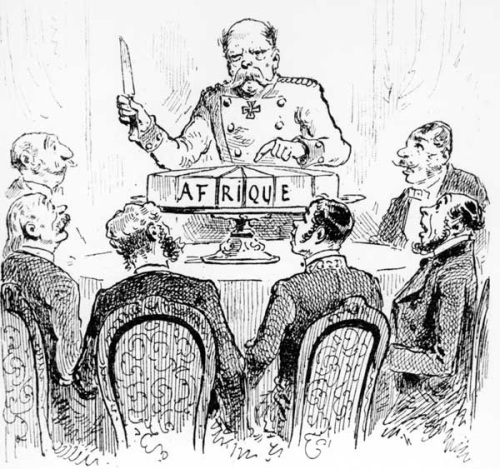

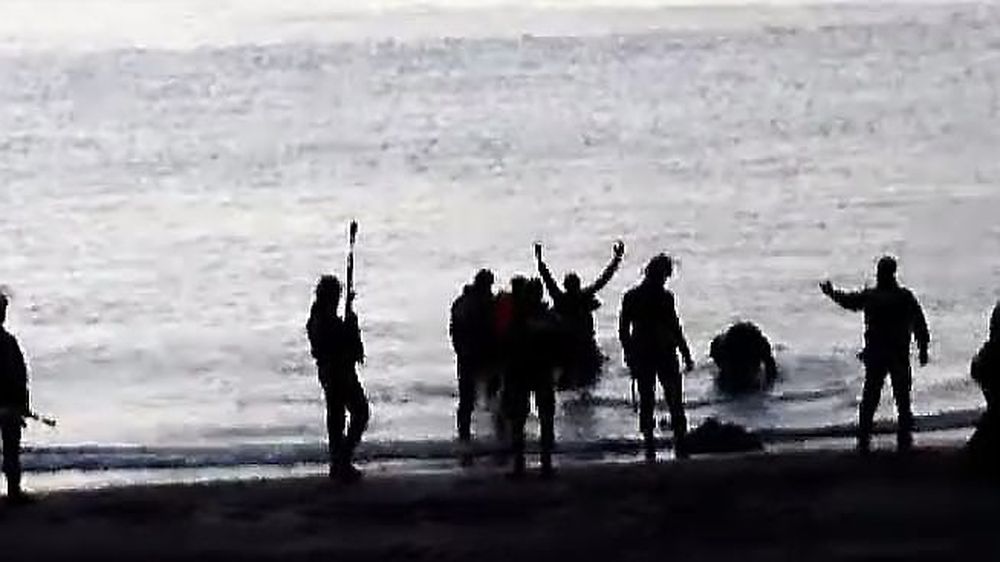
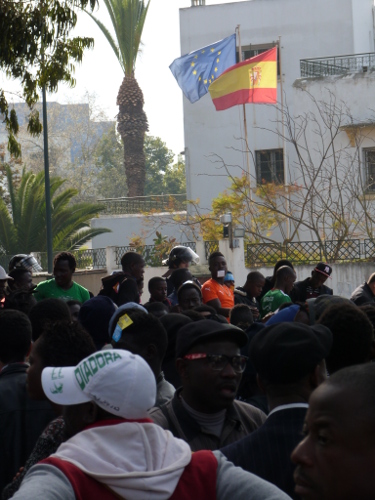
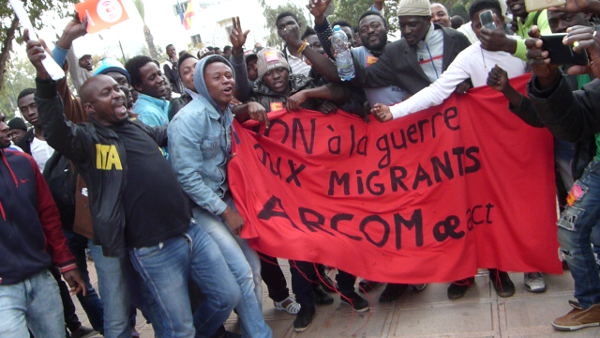
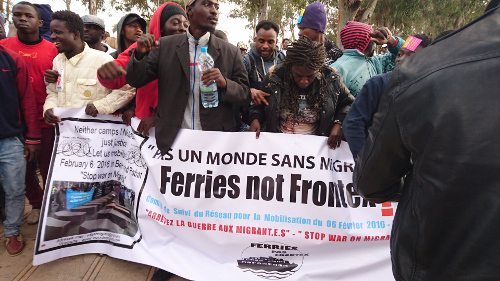 Frontex, agentschap voor Europese grensbewaking, is een militair wapen in de oorlog tegen de migratie. Het beschikt over een arsenaal aan militair materieel en personeel uit alle landen van de Europese Unie en van het Schengengebied. Hiermee wordt middels Rabits (Rapid Border Intervention Teams) zoals onlangs in Griekenland direct ingegrepen daar waar grote groepen migranten plots Europa binnenkomen. Frontex Risico-analyses worden gemaakt om deze flexibiliteit voor te zijn. En zo worden migranten gedwongen gevaarlijkere routes te nemen met alle doden ten gevolge. Maar van enige bijdrage aan de oplossing van het probleem van het vraagstuk is geen sprake. Armoede, corruptie en onderdrukking worden niet aangepakt. Sterker nog, de corrupte staten waar migranten voor vluchten worden gesteund door de Europese staten en Unie. Deze steun is nodig om te komen tot de externalisatie van de grensbewaking. Daar het bewaken van de Middellandse Zee en de landgrenzen van de steeds groter wordende unie nauwelijks te behappen is wordt een buffer buiten de Europese grenzen gevormd. In deze transatielanden dient migratie aangepakt voordat de grens van Europa wordt bereikt. Dat hiermee ook vluchtelingen de kans op asiel ontnomen wordt is meer dan ‘colletaral damage’. Er wordt immers ook voor deze groep geen alternatief geboden voor hun noden en rechten.
Frontex, agentschap voor Europese grensbewaking, is een militair wapen in de oorlog tegen de migratie. Het beschikt over een arsenaal aan militair materieel en personeel uit alle landen van de Europese Unie en van het Schengengebied. Hiermee wordt middels Rabits (Rapid Border Intervention Teams) zoals onlangs in Griekenland direct ingegrepen daar waar grote groepen migranten plots Europa binnenkomen. Frontex Risico-analyses worden gemaakt om deze flexibiliteit voor te zijn. En zo worden migranten gedwongen gevaarlijkere routes te nemen met alle doden ten gevolge. Maar van enige bijdrage aan de oplossing van het probleem van het vraagstuk is geen sprake. Armoede, corruptie en onderdrukking worden niet aangepakt. Sterker nog, de corrupte staten waar migranten voor vluchten worden gesteund door de Europese staten en Unie. Deze steun is nodig om te komen tot de externalisatie van de grensbewaking. Daar het bewaken van de Middellandse Zee en de landgrenzen van de steeds groter wordende unie nauwelijks te behappen is wordt een buffer buiten de Europese grenzen gevormd. In deze transatielanden dient migratie aangepakt voordat de grens van Europa wordt bereikt. Dat hiermee ook vluchtelingen de kans op asiel ontnomen wordt is meer dan ‘colletaral damage’. Er wordt immers ook voor deze groep geen alternatief geboden voor hun noden en rechten.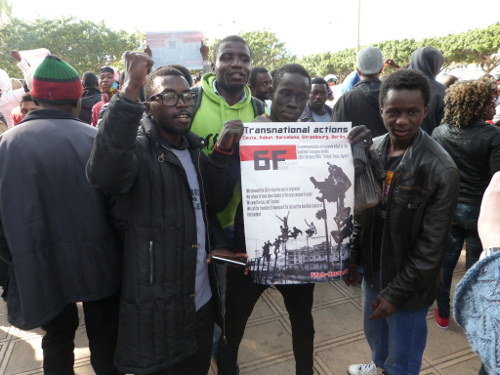 Net als Turkije die nu bijzondere aandacht van de EU krijgt mag Marokko een speciale positie genieten. Het land is zich aan het ontwikkelen van een emigratieland (‘gastarbeiders’) via transitland naar ontvangstland. Het leven van de Sub-Sahara migrant in Marokko is sterk beschreven door Emmanuel Mbolela in zijn boek
Net als Turkije die nu bijzondere aandacht van de EU krijgt mag Marokko een speciale positie genieten. Het land is zich aan het ontwikkelen van een emigratieland (‘gastarbeiders’) via transitland naar ontvangstland. Het leven van de Sub-Sahara migrant in Marokko is sterk beschreven door Emmanuel Mbolela in zijn boek 